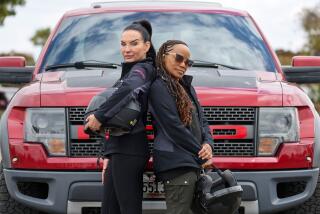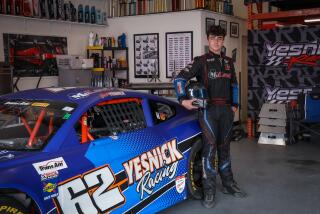‘Hitting the Apex’ documents MotoGP mania
Filmmaker Mark Neale thought he was about two-thirds finished with his motorcycle racing documentary “Hitting The Apex.” His distribution partners at Universal thought he was done.
Neale wanted more time. Universal wanted their movie. When they threatened to take it away from him, he sought backup -- and got it in the form of Brad Pitt. The actor agreed to come aboard as producer, and to narrate the movie, in exchange for more time.
The result is a masterwork of motorsports filmmaking, a lushly shot love letter to the racers on the MotoGP circuit and a nail-chewing drama about the men and the machines fighting for the world championship.
The English-born, Cambridge-educated Neale, 54, was already well known to Universal and to motorcycle enthusiast Pitt for his racing documentaries “Faster” (2003), “Faster and Faster” (2004) and “Faster and Fastest” (2011). Universal, which held some distribution rights, had done very well with those movies.
He began filming “Hitting the Apex” in 2013 with Universal’s support, and some of their money. Working the European MotoGP circuit, he captured footage of one of the sport’s most thrilling eras.
Under his lens, over 54 days of filming, unfolded the passionate, high-horsepower competition among beloved veteran Valentino Rossi, fellow Italian Marco Simoncelli and Spanish riders Dani Pedrosa, Jorge Lorenzo and Marc Marquez.
The racing was fast, faster, and fatal -- and all on film, as MotoGP, though relatively unpopular in the U.S., rivals soccer in some countries as the most-watched sport of all time.
As the 2014 season was ending in April, Neale and his very small crew had shot more than 600 hours of film. Neale began editing, out of the Venice home he shares with his wife, graphic designer Fiona Neale. (Their son Tommy composed some of the music for the film.) He soon was running out of time and money.
Three Universal executives saw a rough cut, Neale recalled. “They said, ‘This is great.’ But I knew it wasn’t. They wanted their movie. I refused, and it got ugly. They wanted their money back. I was staring disaster and bankruptcy in the face.”
Universal, which had invested in the film in exchange for a 20-year option on all international rights but declined to comment, wanted the movie out by 2014. Neale begged them for three more months of post-production. They refused.
Enter Pitt. Neale had been talking to people at Pitt’s Plan B film producing company almost from the beginning, and they’d shown an interest. Now, when he asked for help, they moved in.
“We knew each other through mutual friends, and I had jonesed-out on his previous movies,” said Pitt, a motorcycle man who keeps a Vincent Black Shadow, a Yamaha R1 and several other bikes in his garage. “When he needed some backup -- and me being a fan of the sport, and of him -- I wanted to get involved.”
Pitt’s participation made the studio happy. In late December of 2014 Universal agreed to a new plan. Neale got more time to finish editing -- six months, or twice the time he’d been asking for -- along with Pitt’s filmmaker expertise. Neale moved into Plan B’s offices and edited from January until May.
“He came to the edit every day he was in town, and wouldn’t leave it alone,” Neale said. “He was very tough and critical.”
“We got into the editing room and saw a chance to do something really moving,” Pitt said. “We mythologize these guys as gladiators. But I wanted to try and tell the human side. This was my way to say thank you to the sport, and to the people who contribute their lives to the sport.”
Pitt, who spoke with The Times on a break from shooting the military satire “The War Machine” in the United Arab Emirates, said his voice-over actually isn’t as good as the one Neale did for the rough cut.
But Neale credits Pitt with more than the narration. “The film wouldn’t exist if it wasn’t for him,” he said.
Steve Natt, who co-produced the movie and helped shoot the first footage that became “Hitting the Apex,” said Pitt’s heft was essential in getting more time from Universal -- but that the actor’s expertise in the editing was the unexpected surprise.
“He’s a very powerful person, both in stature and in presence,” Natt said. “But he spent whole days in the editing room working, through all the niggly nuances.”
The result of their collaboration, which Neale said cost about $750,000 to produce, opens in select theaters and will be unleashed online, via iTunes and DVD/BluRay, Nov. 17.
Pitt was headed back to the Middle East to continue work on “The War Machine,” which he described as a cross between “M*A*S*H*” and “Catch-22,” with a touch of “Dr. Strangelove,” based around the war in Afghanistan.
And Neale?
“I may need a little break,” he said. He bought a used BMW R1200GS last year, and he’s hardly started it. “I’m hoping to do a little riding.”
Twitter: @misterfleming







